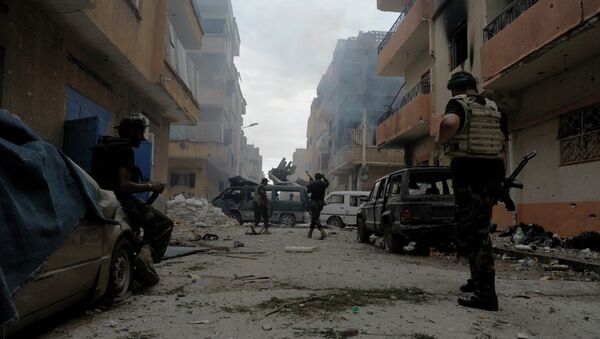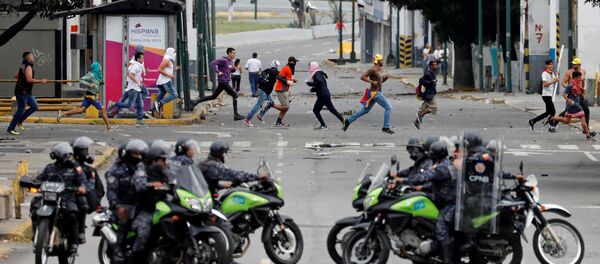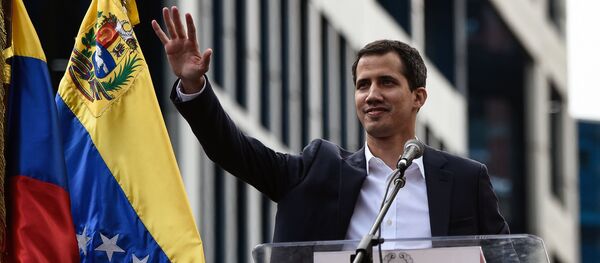"The US is torpedoing any actions to establish peace and dialogue between the opposition and the Venezuelan government," Cuban analyst Jorge Leganoa told Sputnik Mundo, commenting on the political crisis in Caracas.
On 10 January, Venezuelan President Nicolas Maduro was sworn in for his second presidential term amid the months-long simmering political crisis in the Bolivarian Republic.
However, on 22 January, the Venezuelan National Assembly refused to recognise Maduro as the country's leader, thus deepening the political unrest. Meanwhile, opposition leader Juan Guaido swore himself in as the interim president of the country, and Washington welcomed the move.
The citizens of Venezuela have suffered for too long at the hands of the illegitimate Maduro regime. Today, I have officially recognized the President of the Venezuelan National Assembly, Juan Guaido, as the Interim President of Venezuela. https://t.co/WItWPiG9jK
— Donald J. Trump (@realDonaldTrump) 23 января 2019 г.
Leganoa recalled that President Nicolas Maduro had long warned about covert subversive actions by the US and fought against them. He even went so far as to expel American diplomats from Caracas, the analyst noted.
"It was obviously hard for him to make this decision, since even in the most difficult times of Hugo Chávez's presidency diplomatic relations [between the US and Venezuela] had never been completely broken," he said.
Maduro gave US diplomats 72 hours to leave. However, they remain on Venezuelan soil despite the president's order.
The Trump administration has ordered its officials on the ground to follow instructions by Juan Guaido, whom they recognise as the interim president of the Republic.
Maduro has no authority to expel U.S. diplomats or end diplomatic relations. The legitimate President @jguaido has asked U.S. diplomats to stay in #Venezuela. Our diplomats leaving would be tacit acceptance of Maduro legitimacy. Under no circumstances should we leave. pic.twitter.com/Bf3X1EBNCT
— Marco Rubio (@marcorubio) 23 января 2019 г.
"Maduro has no authority to expel US diplomats or end diplomatic relations," US Senator Marco Rubio claimed on his Twitter account. "The legitimate President Juan Guaido has asked US diplomats to stay in Venezuela".
"What is happening is very serious, because it deprives both countries of the possibility of dialogue and, even worse, is shielding itself with young people as part of the Venezuelan opposition, which took to the streets," the Cuban analyst highlighted, adding that the political turmoil in Venezuela has no legal grounds.
"The United States used the exiles to declare a political crisis in the country, and Venezuela was forced to respond. In recent weeks and months, Venezuelans have increasingly returned to their country," the scholar said.
Leganoa highlighted that the self-proclamation of Guaido was "an unconstitutional act".
"The Constitution of Venezuela makes it very clear that under any circumstances one should be sworn in as the president either in the National Assembly of the country or before the Supreme Court," he explained, adding that by recognising Guaido as the interim president the US had only added to the ongoing controversy.
Leganoa noted that the most convenient channel for spreading "fake news" is social media networks.
"There was a chavista march as much or greater than that of the opposition, but the media neither reports this nor about the decline in reserves and the economic situation. Likewise, nothing is said about the people who are working there and trying to build a new country," the analyst said.
Nonetheless, Leganoa raises the question as to how long those fomenting the turmoil will test Maduro's patience on whether to choose peace or revolution. "As of yet, it seems that he will continue to bet on peace," the analyst concluded.
The views and opinions expressed by the speaker do not necessarily reflect those of Sputnik.






